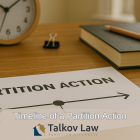Santa Maria Real Estate Partition Lawyer
Talkov Law’s attorneys serving Santa Barbara County are exceptionally experienced in California partition actions and have conducted over 470 for our satisfied clients. A California partition action is a law that allows co-owners of real property to divide the property among themselves. The partition statutes provide a legal mechanism for co-owners to divide the property without having to go through the court system. The partition statutes allow co-owners to divide the property either by agreement or by court order. If the co-owners cannot agree on how to divide the property, then the court will divide the property in a way that is fair and equitable to all parties. The partition statutes also provide that any partition of the property must be in accordance with the laws of the state of California. The legal effect of the partition statutes is that it provides a legal mechanism for co-owners to divide their property without having to go through the court system.
Our team of partition attorneys can assist co-owners with frequently asked questions about partitions, such as:
- Can you lose interest in a jointly owned home by moving out? Generally, co-owners maintain their ownership interests regardless of whether they live at the property. However, in rare cases, leaving the property for many years without paying taxes or other expenses may allow the co-owners in possession to argue that they have adversely possessed the property. Generally, these co-ownership disputes do not get easier with time, so it is important to act promptly.
- Can heirs force the sale of property? Heirs can force the sale of real property in California once that property is distributed to them. However, sometimes, the property is still held in a trust where the trustee will sell the property. When there is no trust, the probate court may decide that the probate administrator will sell the property before it is distributed in fractional interests to the heirs.
- What are the different types of partition in California? Almost all partition actions are partition by sale, though partition in-kind allows the property to be divided, while a partition by appraisal allows the purchase by one-co-owner at an appraised value.
- What is a partition referee? A partition referee is a neutral third party, often times a lawyer or real estate broker, who completes the sale for the co-owners under court authority. The referee is then paid for their services either on an hourly, flat fee, or commission basis, and is relieved by the court of their duties in the case.
- What is the timeline for a California partition action? Most partition actions are resolved in 3 to 6 months by way of settlement. Other cases can take 6 to 12 months to obtain an interlocutory judgment of partition, which generally appoints a referee to sell the property.
Santa Maria is a city located in the Central Coast region of California, about 120 miles northwest of Los Angeles. It is the largest city in Santa Barbara County and is known for its agricultural production, particularly strawberries. The city is home to a variety of attractions, including the Santa Maria Valley Historical Museum, the Santa Maria Valley Railroad, and the Santa Maria Valley Discovery Museum. The city also hosts a variety of festivals and events throughout the year, including the Santa Maria Valley Strawberry Festival and the Santa Maria Valley Wine & Food Festival. Santa Maria is also home to a number of wineries, restaurants, and shopping centers.
Speak to Our Santa Maria Partition Attorneys Today
Call our Santa Barbara County Partition Attorneys today to end your co-ownership dispute. You don’t pay until the house is sold!
Call us at (805) 880-8800 or contact us below to schedule a free, 15-minute consultation
Goesele v. Bimeler – Partition Action Case Study
In the legal case of Goesele v. Bimeler, 55 U.S. 589 (1852), the issue was whether a partition of real estate could be made without the consent of all the owners. The case involved a dispute between two brothers, John and Jacob Goesele, who owned a tract of land in Ohio. John wanted to partition the land, but Jacob refused to consent. The court held that a partition could not be made without the consent of all the owners, and that the partition was void. The court also held that the partition could not be enforced against Jacob, as he had not consented to it. This case established the principle that a partition of real estate cannot be made without the consent of all the owners.
Frequently Asked Questions About Partitions in Santa Maria
How Much Does a Partition Action Cost in Santa Maria?
The costs of a partition action—including attorney fees, court fees, appraiser fees, and other legal expenses—are typically around $20,000. While some cases may incur fees as low as $5,000 or exceed $20,000, depending on their complexity, these expenses are generally shared among the co-owners. The court may also adjust the distribution of these costs based on each party’s level of involvement or responsibility, ensuring a fairer allocation when needed.
Who Can File a Partition Action in Santa Maria?
A partition action can be filed by any co-owner of a property, excluding married couples who own it as community property. A majority ownership is not required to initiate a partition action. Common situations for partition actions include disputes among siblings inheriting property, former romantic partners, friends or family members who purchased property together, and divorced couples.
Who Pays for a Partition Action?
In Santa Maria, each party typically pays for their own attorney’s fees (known as the “American Rule”). However, California partition law allows for an exception to this rule, stating that “the court shall apportion the costs of partition among the parties in proportion to their interests or make such other apportionment as may be equitable.” California Code of Civil Procedure 874.040. Indeed, the court may award “reasonable attorney’s fees incurred or paid by a party for the common benefit.” California Code of Civil Procedure 874.010(a).
Can a Partition Action Be Stopped in Santa Maria?
Generally, a partition action cannot be stopped, but a defendant may be able to buy time to seek a resolution. Eventually, however, the plaintiff can generally force the sale of the property based on the absolute right to partition.
Contact our Team of Experienced Partition Lawyers Serving the City of Santa Maria, County of Santa Barbara, California
Our Santa Maria partition litigation attorneys will work diligently to obtain a favorable outcome on your behalf, whether by negotiation or litigation. Talkov Law Partition Attorneys unlocks access to justice for co-owners by funding your case. For qualified cases, you pay no fees until we successfully partition your property by obtaining a sale on the market or to your co-owner! For a free consultation with California’s first and largest team of partition attorneys at Talkov Law, call (805) 880-8800 or contact us online today.
Serving Areas Throughout California
Orcutt, Nipomo, Guadalupe, Arroyo Grande, Pismo Beach, Grover Beach, and San Luis Obispo































































































































